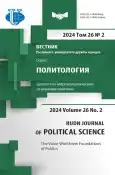Аксиологические основы российской государственности: свобода и правда в идейно-политическом дискурсе XI-XVII вв.
- Авторы: Страхов А.Б.1,2, Боронин А.Р.2
-
Учреждения:
- Государственный академический университет гуманитарных наук
- Московский государственный университет им. М.В. Ломоносова
- Выпуск: Том 26, № 2 (2024): Ценностно-мировоззренческие основания политики
- Страницы: 263-276
- Раздел: СМЫСЛОВЫЕ ОРИЕНТИРЫ ПОЛИТИКИ: ИДЕИ, КОНЦЕПТЫ, КОНЦЕПЦИИ
- URL: https://journal-vniispk.ru/2313-1438/article/view/322430
- DOI: https://doi.org/10.22363/2313-1438-2024-26-2-263-276
- EDN: https://elibrary.ru/NMSUTM
- ID: 322430
Цитировать
Полный текст
Аннотация
Понятия правды и свободы, будучи значимыми для современных российских граждан ценностными категориями, имеют глубокие исторические корни. Поэтому важно рассмотреть их историческое содержание и эволюцию. В связи с этим целью исследования является реконструкция смысла правды и свободы как ценностных категорий. Основные выводы статьи были сделаны в ходе изучения сочинений русских авторов XI- XVII вв. на основе поисковой базы Национального корпуса русского языка. В результате контент-анализа и сравнительного анализа были сделаны следующие выводы. Оба этих понятия, обладая, на первый взгляд, большим количеством разных смыслов, определяются в первую очередь православным христианским содержанием, что позволяет реконструировать их единое общеупотребимое определение. Концепт свободы в текстах XI-XVII вв. во многом напоминал свое современное употребление и был связан с политической независимостью государства или народа, однако в изрядной части документов встречалось понимание свободы как христианского дара, во многом напоминающего понимание благодати и спасения. Понятие свободы наполнялось христианским пониманием свободы от смерти, от греха и Божьего гнева, таким образом, определяя и необходимую практику осуществления самой свободы. Концепт правды, который в современной науке или редуцируется до узкого понимания как права или справедливости, или распадается на значительное количество автономных понятий, также определялся именно христианским содержанием. Несомненно, являясь атрибутом властных отношений, правда выводится из человеческого измерения, а ее носителем является не абстрактный или конкретный князь, не конкретный светский или духовный правитель, а Господь Бог. И частная жизнь, и государственное управление, подчиняясь требованиям правды, приводят к возникновению на земле Божественных установлений и спасению как отдельного человека, так и целого народа.
Ключевые слова
Об авторах
Александр Борисович Страхов
Государственный академический университет гуманитарных наук; Московский государственный университет им. М.В. Ломоносова
Автор, ответственный за переписку.
Email: falconian@yandex.ru
ORCID iD: 0000-0003-4663-7739
кандидат политических наук, ведущий научный сотрудник Научно-проектного отдела Научно-инновационного управления, Государственный академический университет гуманитарных наук; специалист по учебно-методической работе кафедры истории социально-политических учений факультета политологии, Московский государственный университет имени М.В. Ломоносова
Москва, Российская ФедерацияАртем Романович Боронин
Московский государственный университет им. М.В. Ломоносова
Email: boronin.artemm@gmail.com
студент кафедры истории социально-политических учений факультета политологии Москва, Российская Федерация
Список литературы
- Evgenieva, T.V., & Evgeniev, V.A. (2023). Political Perceptions and Values of the Russian Youth in the Context of Their Historical and Cultural Foundations. Humanities and Social Sciences. Bulletin of the Financial University, 3, 94–100. (In Russian). http://doi. org/10.26794/2226-7867-2023-13-3-94-100
- Evgenieva, T.V., Selezneva, A.V., Skipin, N.S., & Tulegenova, D.D. (2023). Request for paternalism: The idea and value of the state in the minds of Russian youth. RUDN Journal of Political Science, 25(1), 233–251. http://doi.org/10.22363/2313-1438-2023-25-1-233-251
- Perevezentsev, S.V., & Ananyev, D.A. (2023). Axiological foundations of Russian statehood: “Truth” and “justice” in the domestic ideological and political discourse. RUDN Journal of Political Science, 25(1), 21–37. (In Russian). http://doi.org/10.22363/2313-1438-2023-25-1-21-37
- Perevezentsev, S.V., Puchnina, O.E., Strakhov, A.B., & Shakirova, A.A. (2021с). “The Fatherland is not in geography…”: On the issue of the evolution of traditional spiritual and political values of Russian civilization. Essays on Conservatism, 3, 263–283. http://doi.org/10.24030/24092517-2021-0-3-245-262
- Perevezentsev, S.V., Puchnina, O.E., Strakhov A.B., & Shakirova, A.A. (2021b). On the methodological principles of studying Russian basic traditional values. Moscow State University Bulletin. Series 18. Sociology and Political Science. Vol. 27, no. 4. pp. 113–133. (In Russian).
- Perevezentsev, S.V., Puchnina, O.E., Strakhov, A.B., Shakirova, A.A. (2021a). “We rule from the great Rurik…”: On the issue of the formation of a single spiritual-political axiological complex “Russian land — Russian state — Russian kingdom”. Essays on Conservatism, 3, 245–262. (In Russian).
- Perevezentsev, S.V., & Sorokopudova, O.E. (2022). Peter I as a political thinker: Traditional values and ideological innovations. The journal Moscow University Bulletin. Series 12. Political Science, 3, 50–73. (In Russian).
- Petukhov, V.V. (2011). The value palette of modern Russian society: “Ideological mess” or the search for new meanings? Monitoring of Public Opinion, 1(101), 6–23. (In Russian).
- Pravda:, Discourses of justice in Russian Intellectual history. (2011). Moscow: Klyuch-S. (In Russian).
- Savelyev, V.S. (2012). Dictionary. In M.L. Remneva & et al. (Eds.), The Old Slavonic Language (pp. 594–670). Moscow: Moscow University Press. (In Russian).
- Selezneva, A.V., Skipin, N.S., & Turkov, E.A. (2023). Value-semantic dominants of political morality of Russian youth: Political-psychological analysis. Bulletin of Perm University. Political Science, 2, 60–70. (In Russian). http://doi.org/10.17072/2218-1067-2023-2-60-70
- Selezneva, A.V. (2022). Political morality of modern Russian youth: Values, ideas, attitudes. Research Result. Sociology and management, 3, 47–60. (In Russian). http://doi.org/10.18413/2408-9338-2022-8-3-0-4
- Selishchev, A.M. (1952). Old Slavonic language. Part 2: Texts. Dictionary. Essays on morphology. Moscow: Uchpedgiz. (In Russian).
- Shestopal, E.B. (2011). Representations, images and values of democracy in Russian society. Politeia, 3(62), 34–47. (In Russian). http://doi.org/10.30570/2078-5089-2011-62-3-34-47
- Sorokopudova, O.E., & Mironov, D.V. (2023). Study of the axiological foundations of Russian statehood: Prospects for using the method of political-textological analysis. RUDN Journal of Political Science, 2, 455–470. (In Russian). http://doi.org/10.22363/2313-1438-2023-25-2-455-470
Дополнительные файлы









